T.S. of monocot leaf is given below, certain parts have been indicated by alphabets. Choose the answer in which these alphabets have been correctly matched with the parts which they indicate -
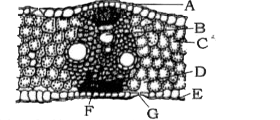
A- Adaxial epidermis, B - Xylem, C- Mesophyll, D-Sub-stomatal cavity, E - Abaxial epidermis, F - Phloem, G - Stoma
A - Abaxial epidermis, B - Xylem, C - Mesophyll, D-Sub-stomatal cavity, E- Adaxial epidermis, F - Phloem, G - Stoma
A - Adaxial epidermis, B - Phloem, C- Mesophyll, D-Sub-stomatal cavity, E- Abaxial epidermis, F - Xylem, G - Stoma
A - Adaxial epidermis, B - Xylem, C - Stoma, D-Sub-stomatal cavity, E - Abaxial epidermis, F - Phloem, G - Mesophyll
The correct Answer is:A
Step by step video, text & image solution for T.S. of monocot leaf is given below, certain parts have been indicated by alphabets. Choose the answer in which these alphabets have been correctly matched with the parts which they indicate - by Biology experts to help you in doubts & scoring excellent marks in Class 12 exams.
Updated on:21/07/2023Similar Questions
In the diagram of excretory system of human be- ings given below, different parts have been indi- cated by alphabets choose the answer in which these alphabets have been correctly matched with the parts which they represent -
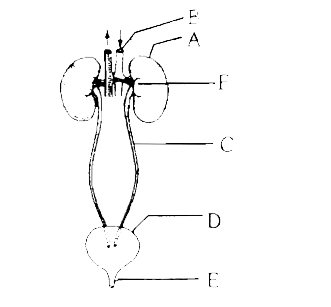
View SolutionTS of dicot root is given below, certain parts have been indicated by alphabets, choose the answer in which these alphabets have been correctly matched with the parts which they indicate.
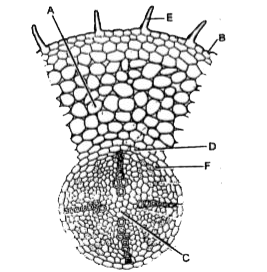
View Solution
Knowledge Check
T.S. of monocot stem is given below, certain parts have been indicated by alphabets. Choose the answer in which these alphabets have been correctly matched with the parts which they indicate -
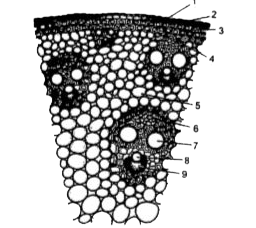 A1:- Cuticle, 2 - Epidermis, 3 - Sclerenchymatous hypodermis, 4-Sclerenchymatous sheath, 5 - Parenchymatous sheath, 6 - Phloem, 7 - Metaxylem, 8 - Protoxylem, 9 - Water cavityB1-Cuticle, 2 - Epidermis, 3 - Sclerenchymatous sheath, 4 - Sclerenchymatous hypodermis, 5 - Parenchymatous sheath, 6 - Phloem, 7 - Metaxylem, 8 - Protoxylem, 9 - Water cavityC1-Cuticle, 2 - Epidermis, 3 - Sclerenchymatous hypodermis, 4-Sclerenchymatous sheath, 5 - Parenchymatous sheath, 6 - Phloem, 7 - Protoxylem, 8 - Metaxylem, 9 - Water cavityD1 - Cuticle, 2 - Epidermis, 3 - Sclerenchymatous hypodermis, 4 - Sclerenchymatous sheath, 5 - Parenchymatous sheath, 6 - Protoxylem, 7 - Metaxylem, 8 - Phloem, 9 - Water cavity
A1:- Cuticle, 2 - Epidermis, 3 - Sclerenchymatous hypodermis, 4-Sclerenchymatous sheath, 5 - Parenchymatous sheath, 6 - Phloem, 7 - Metaxylem, 8 - Protoxylem, 9 - Water cavityB1-Cuticle, 2 - Epidermis, 3 - Sclerenchymatous sheath, 4 - Sclerenchymatous hypodermis, 5 - Parenchymatous sheath, 6 - Phloem, 7 - Metaxylem, 8 - Protoxylem, 9 - Water cavityC1-Cuticle, 2 - Epidermis, 3 - Sclerenchymatous hypodermis, 4-Sclerenchymatous sheath, 5 - Parenchymatous sheath, 6 - Phloem, 7 - Protoxylem, 8 - Metaxylem, 9 - Water cavityD1 - Cuticle, 2 - Epidermis, 3 - Sclerenchymatous hypodermis, 4 - Sclerenchymatous sheath, 5 - Parenchymatous sheath, 6 - Protoxylem, 7 - Metaxylem, 8 - Phloem, 9 - Water cavityTS of monocot root is given below, certain parts have been indicated by alphabets, choose the answer in which these alphabets have been correctly matched with the parts which they indicate –
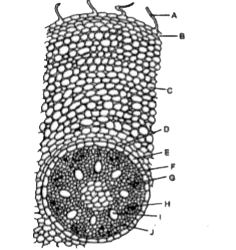 AA = Root hair, B = Epiblema, C = Cortex, D = Endodermis, E = Passage cell, F = Pericycle, G = Pith, H = Phloem, I = Metaxylem, J = ProtoxylemBA = Root hair, B = Epiblema, C = Cortex, D = Endodermis, E = Passage cell, F = Pith, G = Pericycle, H = Metaxylem, I = Phloem, j = ProtoxylemCA= Root hair, B = Epiblema, C = Cortex, D = Endodermis, E = Pericycle, F = Passage cell, G = Phloem, H = Pith, I = Protoxylem, J = MetaxylemDA = Root hair, B = Cortex, C = Epiblema, D = Pericycle, E = Endodermis, F = Pith, G = Passage cell, H = Phloem, I = Protoxylem , J = Metaxylem
AA = Root hair, B = Epiblema, C = Cortex, D = Endodermis, E = Passage cell, F = Pericycle, G = Pith, H = Phloem, I = Metaxylem, J = ProtoxylemBA = Root hair, B = Epiblema, C = Cortex, D = Endodermis, E = Passage cell, F = Pith, G = Pericycle, H = Metaxylem, I = Phloem, j = ProtoxylemCA= Root hair, B = Epiblema, C = Cortex, D = Endodermis, E = Pericycle, F = Passage cell, G = Phloem, H = Pith, I = Protoxylem, J = MetaxylemDA = Root hair, B = Cortex, C = Epiblema, D = Pericycle, E = Endodermis, F = Pith, G = Passage cell, H = Phloem, I = Protoxylem , J = MetaxylemT.S. of dicot stem is given below, certain parts have been indicated by alphabets. Choose the answer in which these alphabets have been correctly matched with the parts which they indicate
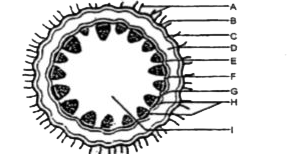 AA = Epidermis, B = Epidermal hairs, C = Parenchyma, D = Starch Sheath E'= Hypodermis (collenchyma), F = Vascular bundle, G = Bundle cap, H = Medulla or pith, I = Medullary raysBA = Epidermal hairs, B = Epidermis C = Hypodermis (Collenchyma), D= Parenchyma, E = Starch sheath, F = Bundle cap G = Vascular bundle, H = Medullary rays, I = Medulla or pithCA = Epidermal hairs, B = Epidermis, C = Hypodermis (collenchyma), D =Starch sheath, E = Parenchyma, F = Vascular bundle, G = Bundle cap, H = Medulla or pith, I = Medullary rays,DA= Epidermal hairs, B = Epidermis C = Parenchyma, D = Hypodermis (collenchyma) E = Starch sheath, F = Vascular bundle G = Bundle cap, H = Medulla or pith I = Medullary rays
AA = Epidermis, B = Epidermal hairs, C = Parenchyma, D = Starch Sheath E'= Hypodermis (collenchyma), F = Vascular bundle, G = Bundle cap, H = Medulla or pith, I = Medullary raysBA = Epidermal hairs, B = Epidermis C = Hypodermis (Collenchyma), D= Parenchyma, E = Starch sheath, F = Bundle cap G = Vascular bundle, H = Medullary rays, I = Medulla or pithCA = Epidermal hairs, B = Epidermis, C = Hypodermis (collenchyma), D =Starch sheath, E = Parenchyma, F = Vascular bundle, G = Bundle cap, H = Medulla or pith, I = Medullary rays,DA= Epidermal hairs, B = Epidermis C = Parenchyma, D = Hypodermis (collenchyma) E = Starch sheath, F = Vascular bundle G = Bundle cap, H = Medulla or pith I = Medullary rays
TS of dicot leaf passing through the midrib is given below, certain parts have been indicated by alphabets. Choose the answer in which these alphabets have been correctly matched with the parts which they indicate
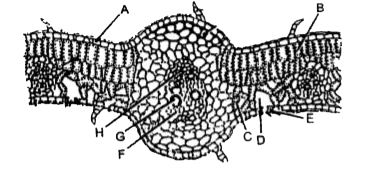
View SolutionIn the diagram of the cross-section of the vascular bundle of monocot stem given aside, different parts have been indicated by alphabets , choose the answer in which these alphabets have been correctly matched with the parts which they indicate
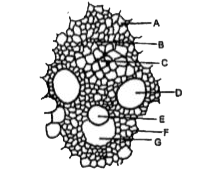
View SolutionIn the diagram of the vertical section of human heart given below certain parts have been indicated by alphabets, choose the answer in which these alphabets have been correctly matched with parts they indicate.
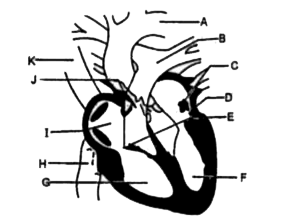
View SolutionIn the diagram of multipolar myelinated neuron given below, different parts have been indicated by alphabetes, choose the answers in which these alphabetes have been correctly matched with the parts which they indicate

View SolutionThe following diagrams shows the corss-section of the vascular bundle of monocot stem given aside, different parts have been indicated by alphabets, choose the option in which these alphabets have been correctly matched with the parts which they indicate
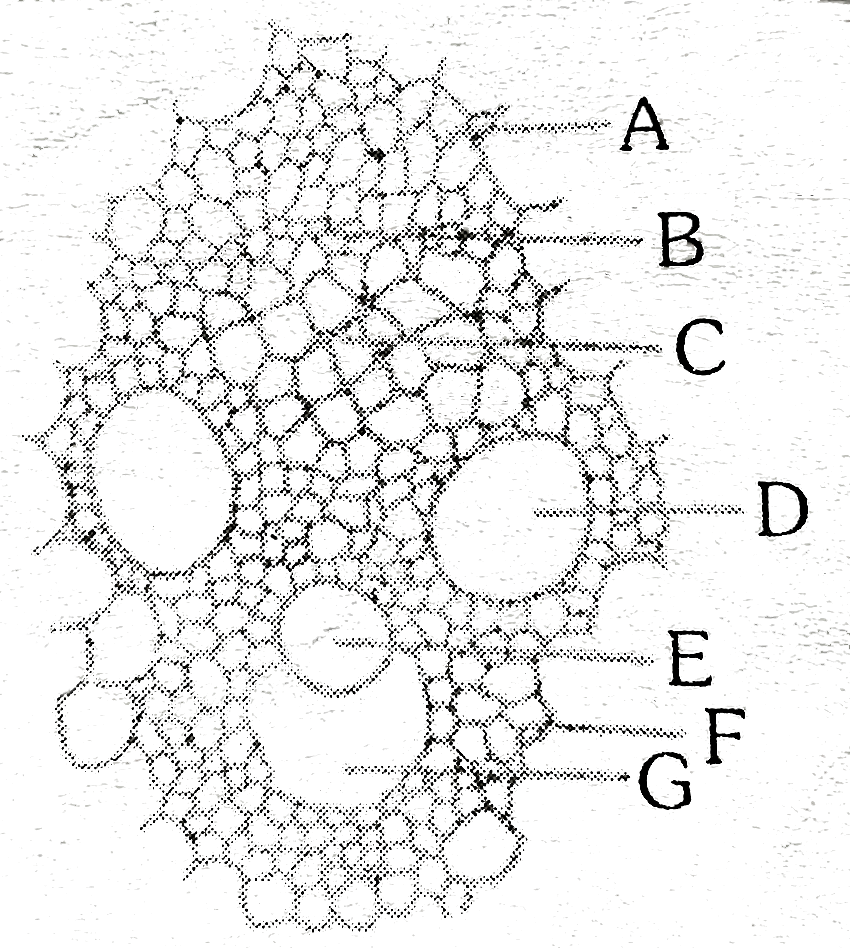
View Solution
